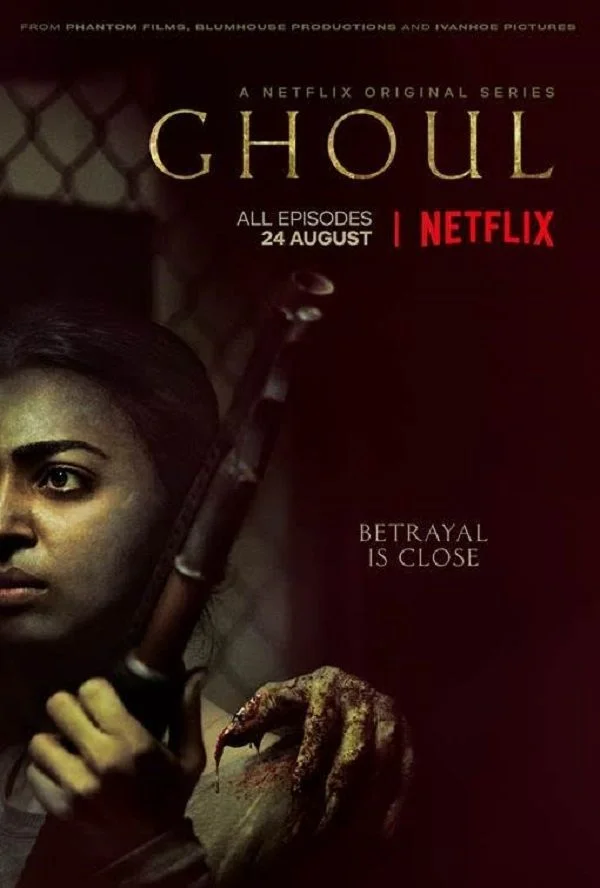The Cabin at the End of the World
In the woods, there’s a cabin. It's situated by a lake, just a "lonely red dot." It’s one of those remote cabins you always see in horror movies. Inside, a family. Eric and Andrew, two parents. Wen, an adopted vivacious girl. They’ve come here for vacation. To unwind and unplug. Cell phones don’t work here. And there’s no internet. Just the three of them, enjoying nature, board games and each other.
On this particular day, Wen is out front catching grasshoppers, while her dads are on the back porch, reading. Wen hears gravel crunching and in the distance she sees a large man walking down the gravel road toward the cabin, clad in jeans and a tucked white dress shirt. Soon, he’ll be joined by three others, two women and another man. Notice the four interlopers’ shirts, all the same except for the colors: Red, Off-White, White and Black. This seems like an odd coincidence, but savvy readers will instead pick up a connection to The Four Horsemen of the Apocalypse.
These four strangers do not know each other and they do not know the family they have come to see. Yet they have come to this lonely, remote spot, armed with makeshift weapons that seem pulled from the middle-ages. And in this cabin by the lake, Eric, Andrew and Wen are going to be forced to make an unimaginable decision and sacrifice. For the good of the world. Maybe.
That is the basic gist of Paul Tremblay’s tremendous new novel, The Cabin at the End of the World. I’m always interested in the titles of books, especially when the titles operate on multiple levels. The last novel I read by Tremblay was A Head Full of Ghosts, which had an evocative title with multiple meanings. So to does his latest. Most directly, there's the biblical concept of "The End of the World," which is obviously appropriate given the story and the strangers apparent intent. But as I was reading, I started realizing that the title, "At the End of the World" also brings to mind a location, far removed from civilization and humanity. It evokes isolation and distance.
Another connection between A Head Full of Ghosts and his latest is how he expertly takes a genre and turns it on its head. Ghosts took the idea of possession and deconstructed it to heart-breaking and chilling depths. Here, we have both a cabin in the woods story and a home invasion story. But, again, the invasion has been flipped.
The four people who end up capturing Eric and Andrew seem like normal people. They’re polite. They tend to the wounds. Feed them. Make sure Wen has Stephen Universe or Adventure Time to keep her occupied. It’s not the typical invasion seen in movies like The Strangers. And while their message is dire, they never threaten bodily harm on the family. Instead, the cajole and plead with them to make a sacrifice. The strangers empathize with the situation they’ve put the small family in. Trust them, they don’t want this to happen. But the fate of the world is at stake.
What follows from the opening pages is a roller-coaster of emotions and tension. Utilizing different character perspectives, Tremblay wisely changes the audience's perceptions throughout the book. He kept me on edge, wondering whether the events were truly apocalyptic or if were they a delusional fiction, dreamed up by these four interlopers. Their story is ridiculous. And yet, they just have to turn on the news to see horrific events happening just outside their cabin. What's truly scary about The Cabin at the End of the World is how it's a perfect and chilling encapsulation of our time.
I want to circle back briefly to the “At the End of the World” title. As I mentioned above, it brings to mind the isolation of the cabin and how far away from civilization it is. But let’s take that to the next logical step. The book is about how we’ve become little cabins to ourselves. It’s ironic that as we become more connected online, the further isolated we feel. As the ability to communicate and to share news increases, so to does the responsibility inherent in it. It’s so easy to find a group of people who share your thoughts and views, regardless of their validity or appropriateness. A marginalized group can find like-minded individuals, for better and for worse. The internet has brought together disadvantaged and disenfranchised groups. It has helped those in need realize they are not alone in this world. And that’s a great thing.
But what if the unifying thought that brings a specific group together is inherently bad or evil or destructive? It’s a lot easier now for a group of neo Nazis to find each other, for example. The internet allows delusional individuals who have a warped view of the world band together and feed into each others delusions. Their ideas then percolate. That idea, however wild or warped, can become the absolute truth that these individuals hold onto and make part of their identity. And when that kind of negativity spills out from the internet—which it invariably is destined to do—the results can be disastrous. We've experienced may real world instances of this type of hate exploding around us. Death threats, harassment, doxxing. These have become more and more a part of our collective fears.
Tremblay does such an excellent job of unspooling the story, adding layers and depths to the characters who may seem a bit flat upon first inspection. This cabin is full of damaged people, struggling to find reason in the world. He doesn’t give easy answers. His story teeters on the ambiguous and it constantly challenges how you view the story and its characters. Similarily, our world doesn’t give easy answers. Ultimately, readers will have different existences reading and digesting this heady novel. I can see that there will be a variety of different interpretations of the ending. I know how I feel about the events of the novel and what it ultimately means.
I bet I can find a group that agrees.






![[Semi-Review] Now Apocalypse: The First Half](https://images.squarespace-cdn.com/content/v1/5b39608d75f9eef54c62c3f0/1551034744057-J6F5YSFXFM1TVTB2IPNB/84bb1259-f6ca-4228-b4de-6b84e58424b0.jpg)
![[Review] At the End of the Day](https://images.squarespace-cdn.com/content/v1/5b39608d75f9eef54c62c3f0/1551052477523-WTRCHASRF5YTBVHFVJ2E/ATEOTD+_Poster_Final.jpg)